Tkay Maidza: stay positive
The Australian artist had a weird enough year in 2016 that, despite everything, she's still feeling good about 2020
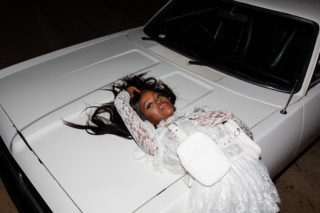
The Australian artist had a weird enough year in 2016 that, despite everything, she's still feeling good about 2020
“I’m very deep into astrology,” Tkay Maidza tells me, “and numerology cycles.”
Maidza is the Australian hip hop artist making waves with her latest project, Last Year Was Weird – an EP trilogy, a series of music videos and a clothing collection that reflect on 2016, her weirdest year to date; the year she released her debut album, before she’d even turned 20. The second EP dropped last week, but given the project was conceived before the shitshow that is 2020, I’m keen to get her take on the current weird year, especially since she’s telling me about numerology, the divine art of understanding life through numbers, and how she’s come to think about her recent experiences in light of it.
Like astrologers with stars, numerologists read numbers as meaningful to people’s lives – making predictions about personality traits and future paths by imbuing numbers with deep significance. One aspect of this is seeing life as a series of nine- or ten-year cycles. According to numerology, we can all take better control of our experiences by understanding these cyclical rhythms. “You go into this new world in the first year, and then you reap what you sowed in the previous cycle in the second, third and fourth years,” Maidza explains. “In the fifth year you have a big lesson you have to learn – and then in six, seven, eight and nine you’re dealing with it and finding a way to fix it. Then in the tenth year you should have sowed enough to start reaping again.”
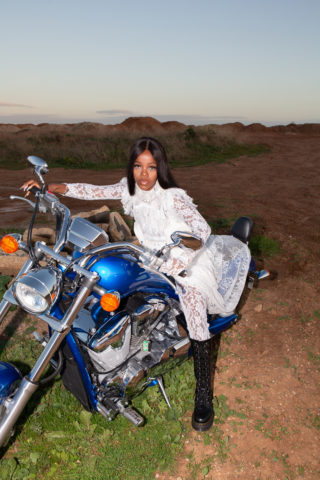
It’s no surprise for Maidza that 2020 is throwing us in unexpected directions. “I think for me it’s the end of a cycle, the beginning of a new one,” she says. “Because before you can start learning new things, becoming a new version of yourself, something has to shake you up completely.”
Certainly, the events of this year have done that. It’s been such a crazy period that the unprecedented Australian bushfires, which ravaged the country, destroying thousands of homes and killing billions of animals, already feel like a distant memory. “I was spending a lot of time in Sydney and that’s where it was affected the most,” says Maidza. “I mean, you’d just leave your house and the sky was red for, like, a month. And it was really odd – after another month you’d leave your house and like, ‘Oh wait, the sky is still red, this is not great.’ And there was a lot of trips when I was there, and then I went home and I came back and I was like, ‘Wait, the sky is still red’. There’s animals dying – that was very worrying for sure. But because I wasn’t really staying in one place too long, and when I was I was in Adelaide, where there weren’t too many bush fires, I didn’t really feel that affected. But there were a lot of festivals and stuff cancelled obviously, and a lot of artists did a lot of stuff to raise money for relief funds… I forgot that even happened this year! So much has happened!”
So how does that square with numerology?
“2020 feels like ten years. 2020 is the new cycle: we’re about to enter the new period – we’ve spent years working really hard and building up to the new era. And I think that everyone felt that that’s what 2020 was: ‘Ok we’ve had a whole decade, time for a reset.’” She laughs, still optimistic. “I think lots of people have worked hard and are like, ‘I’m gonna go for it in 2020’. That’s what it felt like for me. And it still does. Professionally, I’m in a much better place than I was five years ago.”
Five years ago, Maidza was still making dance music, and although she’s reluctant to go into too much detail about the personal aspects of the last cycle, which included a change in management, she does say that one major shift was finding an outlet for her authentic creative voice. In her late teens, she began to tire of the brand of dance-pop she was known for during the writing of her debut album Tkay. When that record dropped in 2016, she realised it was time for another direction.
“I was in the dance world basically, and more of my music was dance focussed. But I grew up listening to hip hop – I like pop music, but it hasn’t always been the focus for me, and dance was really foreign. When it started it felt really exciting, and then over time I personally just got a little sick of it. I think it was also the way the landscape was moving as well. Everyone just became sick of dance music at one point because it was so oversaturated, and I found myself in this pond where I was like, ‘I don’t really like this music, I wanna do some soul music, I wanna think about what I have to say.’”
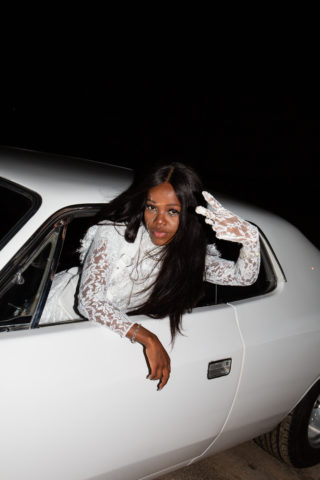
When I ask Tkay what the big lesson was that she had to work through, she says: “I was just really unhappy with the development of my sound. I wanted to say more, or to feel more when I made the music. And that’s not discrediting what happened in my career at that time. A lot of great stuff was happening, but I just wanted to regain control – I felt that every time I made a song it was too easy. I had a lot of yes men around me saying, ‘This will totally work’. And I’d be, ‘Are you sure?’, and they’d say, ‘Yeah’. And in a lot of those situations I wasn’t one hundred percent and the fact a lot of people were saying yes to me didn’t make sense, especially when it didn’t go to plan. So I just wanted to rearrange it and take a second to just revisit and rethink about what my intentions were. So that was a big part of the Last Year Was Weird story really.”
There was a certain amount of fear involved in making the switch from dance to hip hop and R&B. Maidza’s early success was immediate (the vocals from the first song she ever recorded, aged sixteen, were picked up by a local producer in Adelaide and made into a track played on Triple J, Australia’s national alt-music radio station) but there were sacrifices involved. She had given up a promising tennis career to pursue music, and dropped out of an architecture degree once her music started to take off. The thought of giving up a so-far charmed path and the possibility of failure, or at least of not being taken seriously, had held her back from creating the music she most wanted to make.
“You could say I was scared,” she says. “If I was doing pop music, then people who liked rap didn’t have to judge me for being this hybrid thing. But then that’s actually just who I am, and I need to embrace it. And that’s a lesson I’ve learnt over time. But I think when I was making the album [Tkay], I was like, it’s a pop thing and that’s so easy and I can just do whatever I want really quickly, but I don’t think that’s what I was meant to do. I think sometimes taking the easy road isn’t the right thing.”
Tkay’s new sound, as showcased on LYWW, is genre-bending, taking in hip hop, pop and RnB, and most notably influenced by old school US rap and UK grime. There are also parts that remind me of ’90s UK garage, such as the syrupy-sweet track ‘24k’ on the latest Vol. 2 EP, and there are references to the US alt-hip hop scene too, with a guest appearance from breakout Baltimore rap collagist JPEGMAFIA on ‘Awake’. It’s hard to tell if Maidza is a better rapper or singer, as she does both so well; almost cutesy on playful diss track ‘So Sad’, yet venomous when spitting bars through the warped ‘Awake’, the banging single ‘Shook’ and the distorted ‘Grasshopper’, the latter two hitting like classic Missy Elliott and current Skepta, respectively. But despite the clear influences, this is an original artist, finding her own methods and giving voice to the African Australian experience, which is so far almost completely invisible in popular culture.
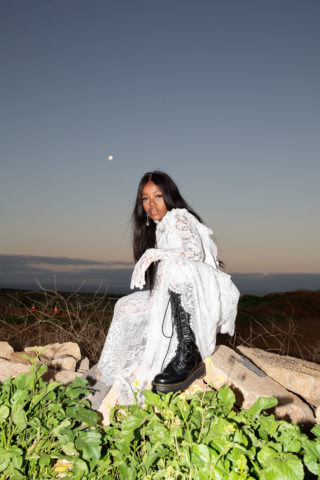
The experience of the Black diaspora is often understood as a single, unified one – partly because of the dominance of the African American experience in film and music, and the influence of US imagery not only in popular culture but also in the conceptual horizons, conditioned by political and media debate, through which we can imagine ourselves. The stories of Black lives that gain global exposure limit the horizons for experiences that don’t fit a preordained narrative. As Maidza explains, this means finding a Black Australian hip hop voice that feels genuine has been difficult, especially since the mainstream Australian hip hop scene has traditionally been dominated by white men, such as the ’90s group Hilltop Hoods. Tkay describes them as “like Eminem, except that there’s three of them instead of one.”
“They’re classic Australian hip hop,” she says. “They’re like the beginning basically. There’s that kinda landscape where it’s more like classic Eminem, you know – big chorus with the cool rap verses, boom-bappy, just kind of old school. There’s that kind of stuff happening and obviously their stories are based on Australian lives, and I feel like it’s hard for me to say what the Australian life or the general Australian story is, because I don’t feel like that is my story. But there is that scene where it’s like white men who rap about their thing, and then there’s the new wave, which is more like African Australians, that are more influenced by the UK and the US, and that’s probably where I sit within it. I think most of the ones that do really cool things are more on the alt side. Because I feel like even if you’re African Australian you’re not going to tell a story of gang violence, or police corruption or all that stuff.”
If hip hop was born from a sense of shared struggle in the US inner city, then the Australian hip hop that Maidza is pioneering finds room for the individual story in a national identity that’s almost entirely white. “I just don’t think there are a lot of us here yet,” she says. “And we still have a long way to go in terms of claiming our culture and living and experiencing before the rest of the world can really relate to us.”
Maidza arrived in Australia in 2001, emigrating from Zimbabwe with her family when she was five years old so that her parents could find work in the Australian mining industry. They lived in a small town in Western Australia, one of only three black families there, before they moved to Adelaide, a larger city that is a hotbed of creative talent (Sia and Orianthi are notable Adelaideans, as well as writers like JM Coetzee). But as Maidza points out, most of the talent swiftly move away once they gain success, leaving Adelaide feeling culturally barren – a sprawling suburb as opposed to a bustling metropolis. The pull to move elsewhere is one Maidza has felt, and one that seeps into her songwriting, which also has a distinctive edge shaped by the local culture.
“I feel like a lot of my songs are about amounting to something bigger,” she explains. “So a lot of my songs are about wanting to leave. I think a lot of people from Adelaide are on the hipster side, so they like UK sounding music, the clubs play a lot of alternative, so if it’s rap it’s alt, not mainstream, so that probably caters to my taste of music, and what I make is just a bit more alternative, a bit left. There are a lot of stoners – I’m not really a stoner, but everyone [in Adelaide] is kind of spaced out and has too much time.”
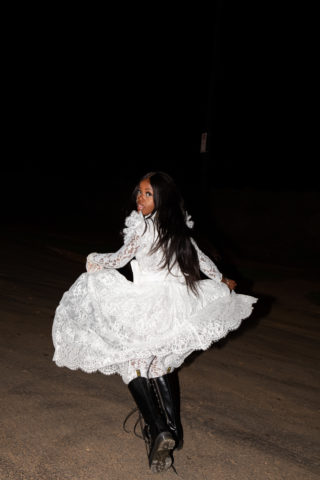
Mostly, when she’s home and has a little free time, she likes to hang out at Grange Beach, reading and eating ice cream. Of course, this isn’t to say the Black Australian experience is an easy one. The racism Maidza experienced during her early years in the country felt not so much systemic as personal; a result of her neighbours’ fear of difference rather than a looming, hostile state.
“Obviously, if you’re one of three or four families living in a country town, a lot of people are just gonna be like, ‘Who is that person and why are they here?’. And I definitely do remember experiencing racism when I was growing up – I experienced it quite a lot, and probably to the point where I just started to stonewall it and pretend it wasn’t happening. I just became so accustomed to it that if someone said something, I almost didn’t hear it. And I think with the whole Black Lives Matter thing, it just triggered so many memories of these things – of people saying so many things to me. And I’m just like, ‘That wasn’t ok.’” She smiles tightly, shrugging off the past. “It definitely was tough growing up, but I just learned to block it out and do my thing, because it just seems like the problem is them just not understanding how to interact with people they have never seen.”
This brings us back to the other problem, which is writing music about a way of life that most people are ignorant of, and for which there is no clear collective struggle that’s already been widely documented in the media. Nonetheless, if police brutality has rightly dominated the Black Lives Matter headlines, there’s surely an equally important daily injustice in having no cultural point of reference for your own life.
“If anything, a lot of Australians probably tell a story that’s similar to UK artists,” Maidza explains. “We still don’t have crazy gang violence or anything, but more like daily life feelings, emotion. For me I just write on how I feel – feeling betrayed by my friends and just wanting to amount to something, wanting to prove I’m more than what people think I am — that’s like the base of my story, and then there’s like relationship stuff, and I think that’s what a lot of other Australian rappers that are on the new wave talk about really. I don’t think we’ve lived here long enough to have the stories that Americans have, and the people who rap here, I don’t think we have the same stories as Americans do, so we can only talk about our daily lives, feeling left out, having dreams.”
That’s one reason she sees her sound as a work in progress. “I’m still trying to figure it out. I’m still learning about the world and I feel like the only story I can tell is my own, and I can only speak about what I would like to happen, and I think from that I hope other people can listen and be more affirmative about who they are. And if you feel underestimated that’s ok because I do too. I’m just trying to tell my story and that story is: I’m just trying to figure out who I am. So, it’s just everyday: everyday people, just mutual experiences, love and friends and that kind of stuff.”
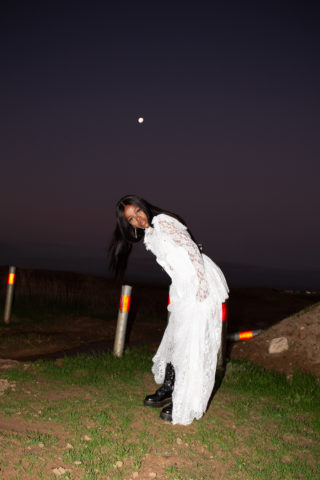
Experimenting with the visual aspects of her creativity through clothing design and making her music videos has been one way of keeping control of her voice, and staying true to the art she wants to make. Drawing and art has also been an escape during lockdown, when music studios have been less accessible.
“I think for me I’ve always kind of just followed other people’s orders. So, for me [this hybrid LYWW project] is my way of saying, ‘Wait, I wanna say what I wanna say about what I see, and how I feel’. And I think in a lot of situations I’ve never been confident enough to speak out. And this felt like the place I could do it without anyone judging what I said. It was just my thing and I can be who I want in this sphere. So that’s why I do it – because I want to see things and document things. I wanna be free and show other people they can do the same thing as well. Even if you’re not really saying a lot and you’re heartbroken and you just want to lay in the grass, that’s fine. I want to do that too!”
Her sound is still developing, but Maidza feels most confident on stage, so the recent restrictions on live performance have been a real blow.
“I feel the performance version of myself is just super Tkay. A lot of people go, ‘Oh I didn’t expect you to be like that!’ because I’m always climbing things and crowd surfing and just screaming at people, and in my daily life I’m never like that. I think that for me, when I play a show, there’s the challenge of doing something that the people, and the team, hasn’t seen. Because then it’s like an inside joke with the people that are on stage. They’ll say, ‘I didn’t think you were gonna climb the scaffolding’, or, ‘I didn’t think you were gonna crowd surf this time because the crowd was being weird’ or whatever. So, it’s always about me and my band having fun on stage first, but also seeing how crazy we can go. You know, because then it’s more fun for us for when it comes to the whole tour and stuff.”
As we speak there are signs that Adelaide might be opening up a little, but a second wave of COVID soon threatens to extend the lockdown.
During these past four months, Tkay Maidza has had to become a one-woman operation, shooting her own photos, making green-screen videos, taking the time to really appreciate how much she’s changed and developed since that weird year. It hasn’t been a totally negative experience. Despite everything, 2020 looks like it might be a good year. “I feel like I’ve spent the past three years rearranging, learning, just improving. I feel like I’ve grown so much as a person. I’m more eloquent with my ideas and it’s evident what I want to do. This year my music feels so much better. Everything feels clearer than it did a year ago.”